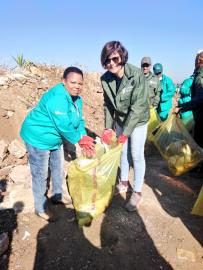
CAPE TOWN, Dec 1 (NNN-SANEWS) — The Minister of Forestry, Fisheries and the Environment, Barbara Creecy, says government’s initiatives aimed at tackling plastic pollution are making progress.
South Africa has achieved this through a combination of voluntary approaches to the plastics industry, coupled with improved household and community waste disposal and the creation of Extended Producer Responsibility (EPR) schemes.
“The SA Plastic Pact has already identified unnecessary and problematic plastic products, and is committed to eliminating unnecessary and problematic plastics; ensuring that 100% of all plastic packaging is reusable, recyclable or compostable; ensuring that 70% of plastic packaging is effectively recycled, and using 30% average post-consumer recycled content in plastic packaging,” the Minister said.
Addressing the South African Plastic CEO Engagement Breakfast in Cape Town, Creecy said in 2020, government adopted the National Waste Management Strategy.
The strategy prioritises the following pillars:
- Support and strengthen municipal waste management services to prevent plastic leaking into the environment;
- Increase waste diversion from landfill through various approaches, including EPR schemes, to collect, reuse and recycle plastic waste with the aim of promoting a circular economy in the plastic industry, and
- Promote public awareness and clean up campaigns to remove plastic waste from rivers, wetlands and beaches. Enforcing compliance is also an area of focus.
“In 2020, government also introduced the Extended Producer Responsibility Regulations, which called for EPR schemes for plastic packaging and electrical and electronic equipment amongst other prioritised products.
“This circular economy and EPR initiatives have resulted in the formation of five registered extended producer schemes that support plastic waste collection and recycling.
“Our EPR Regulations aim to influence product design to take environmental considerations into account and are currently being implemented for paper, packaging and some single use products, lighting, electrical and electronic products,” the Minister said.
These efforts have removed 368,600 tons of plastic waste from the environment. They have supported between 60,000 and 90,000 waste reclaimers, as well as create 7,500 formal jobs.
“In 2023, government put a restriction of a minimum of 50% recycled content as part of the product design measures for plastic carrier bags. The intention is that by 2027, plastic carrier bags and black refuse bags should be made from 100% recycled material.
“Because we share industry’s concerns regarding the contribution illegal dumping makes to the leaking of plastics into the environment, we recently launched the Municipal Cleaning and Greening programme.
“This partnership with provinces and municipalities targets clearing 7,251 illegal dump sites by creating more than 37,000 work opportunities under our public works programme,” Creecy said.
Through the Top 40 programme, government has prioritised 40 municipal landfills for improved compliance through a public-private partnership model currently championed by Infrastructure South Africa.
“Together with the Department of Cooperative Governance and Traditional Affairs (CoGTA) and National Treasury, we have revised the Municipal Infrastructure Grant Policy so municipalities can purchase yellow fleet to improve household collection and improve landfill management.
“Since the initiation of this programme, our department has processed applications for specialised waste management vehicles from over 100 municipalities across the country. In the last two years we have spent over one hundred and sixty-four million rand to buy 44 waste collection vehicles and 21 landfill management waste vehicles for 58 municipalities,” the Minister said.
By 30 September this year, 1,299 (or 19%) of the sites were cleared.
“I am confident that with the acceleration of the cleaning programme, 100% of the identified hotspots will be cleared by the middle of next year. The workers clean daily and educate their communities on how to dispose of waste in a responsible manner,” the Minister said. — NNN-SANEWS
